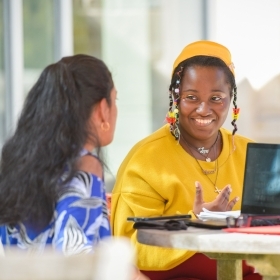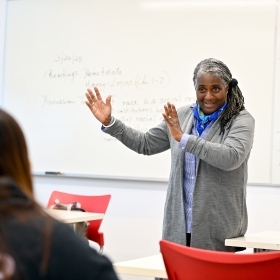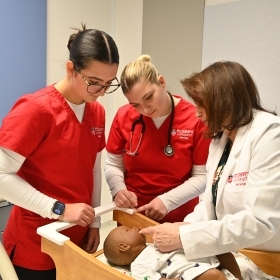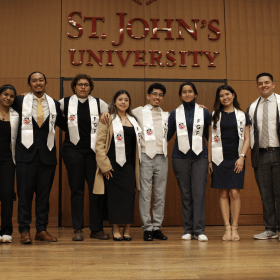ACEI Inclusive Teaching Fellows Organize Local Professional Development Initiatives across Campus in Fall 2022
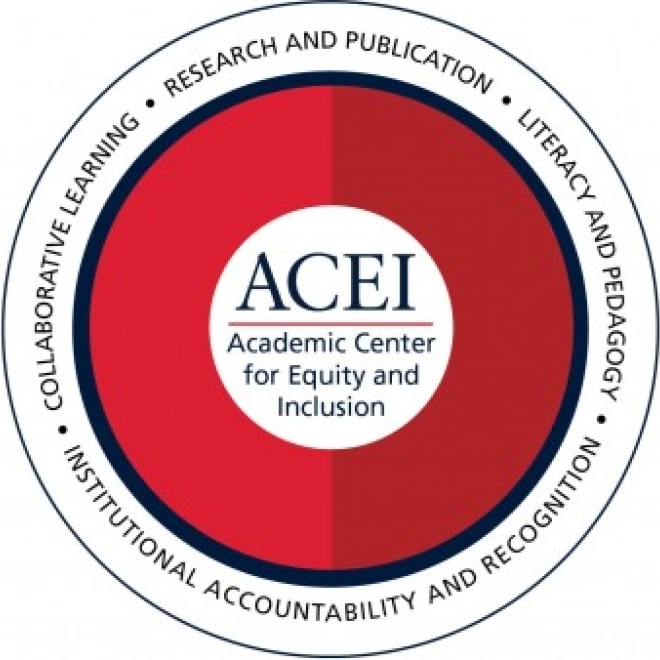
In 2022-2023, 21 St. John’s faculty are serving as the inaugural cohort of the Academic Center for Equity and Inclusion (ACEI) Inclusive Teaching Fellows program. These faculty members are organizing six professional development initiatives in three colleges, reaching dozens of colleagues around the shared goal of implementing more inclusive teaching practices.
The Fellows program aims to build our collective capacity to support inclusive teaching on campus, create excellent faculty-led professional development on inclusive teaching, strengthen faculty relationships by building community, and cultivate faculty leadership. We are excited to highlight the projects being undertaken by our colleagues in this program this fall. Each group of fellows will share reflections and findings on their work with the university community in Spring 2023.
Global Learning is for Everyone
Drs. Anne Galvin, Zoe Petropoulou, Heidi Upton and Phyllis Conn will sponsor three workshops this fall for St. John’s faculty in New York and abroad. These are interdisciplinary workshops where faculty learn more about implementing global learning and Diversity, Equity, and Inclusion (DEI) approaches into their courses. These workshops aim to encourage faculty to offer inclusive global learning opportunities for all students regardless of ability to take part in the Study Abroad program. The workshops are led by Hilary Landorf, using her book Making Global Learning Universal (2018) to support faculty in reworking global competency-oriented syllabi and assignments with inclusivity in mind.
The first workshop, “Mapping and Designing Global Learning with DEI,” was open to the whole university on September 12. In this workshop, faculty explored the process of global learning and its potential applications in the curriculum and co-curriculum. In the second workshop, for “Global Learning is for Everyone” Learning Community members, participants will align learning objectives with assessment activities and will discuss "global learning problems" through the DEI perspective for their course content. In the third workshop, Learning Community participants will share the material they have been revising during the Learning Community to discuss how their course has been enhanced through the lens of global learning with emphasis on DEI.
Humanizing Online Courses to Create More Inclusive Learning Environments
As the pandemic taught us, teaching and learning in digital spaces has become the new norm. However, online courses can often lack the personal interactions and experiences that are more common in traditional, face-to-face courses that help students to feel connected and supported (Jones et al., 2008; Rowntree, 2000). Students’ social and cultural practices, storied histories, and varied experiences are valued in the meaning-making process, and tailoring curricula to include and value these practices may lead to more engaged learning experiences for students (Bialostok, 2014; Cope & Kalantzis, 2000; Mills, 2009). Therefore, this ACEI Inclusive Teaching Fellows initiative by Drs. Olivia G. Stewart and Katya Midgette aims to examine how online courses can become more humanized to improve the learning experiences and literacy practices for online students through an examination of culturally relevant and anti-racist online teaching practices.
Queer Vibes Only: Reimagining Pedagogy, Visibility, & Activism in Queer Inclusive Courses
“When I dare to be powerful, to use my strength in the service of my vision, then it becomes less and less important whether I am afraid.” ― Audre Lorde
During Spring semester 2021, the University engaged the Transgender Training Institute (TTI) to conduct an LGBTQ+ Climate Assessment. TTI's Assessment Report stated the concern that our standard course offerings provide “very limited options for students to engage with LGBTQ+ specific content.”
To help remedy this academic gap, Drs. Amy Gansell and Rebecca Wiseheart invite faculty to attend a Fall Workshop Series to support the infusion of up-to-date LGBTQ+ content into current courses and to stimulate the development of new LGBTQ+ centered courses. Led by Safe Zone Certified Co-Facilitators Drs. Lisa Robinson and Danielle Bacibianco, the workshops aim to create more equitable and inclusive pedagogy, curriculum, and learning spaces, as we question and challenge ourselves and our curriculum choices so that LGBTQ+ inclusion in our classrooms is more visible, livable, equitable, and student-centered.
Session #1: “The ABC’s of LGBTQ+ Inclusion: Pedagogy, Act Up”
Wednesday, October 12th: 10am-1pm, brown-bag lunch -Register here!
In this session, we will discuss lingo, terminology, history, and current events to better understand the ins and outs of how queer language shifts, changes, and is still evolving even as each semester begins. Once that solid base has been created, the facilitators will co-create a community environment where we can discuss previous attempts to include LGBTQ+ issues, to workshop what worked and what did not, and to envision a safe space where all questions are welcome.
Session #2: “Don’t Let Your Inner Saboteur Get In Your Way: From How We Teach to Shaping an Out-Loud Syllabus”
Wednesday, November 2nd: 10am-1pm, brown-bag lunch -Register here!
This session will focus directly on the exploration of syllabus activities, readings, and assignments. We want to make sure that everyone walks out of this workshop with practical lesson plans and activities to be applied directly to syllabi. Depending on each instructor’s core discipline, these potential units and activities can shift along with any underlying field.
NOTE: Participation in Session #1 is not required for participation in Session #2 (but we hope that all will attend both!)
Incorporating Education About Bias, Cross-Cultural Competency and Racism into Experiential Learning Curricula
This project is intended to provide a powerful opportunity to strengthen inclusive teaching as a tool for teaching three important content areas of bias, cross-cultural competency, and racism in the law school’s externship and clinical programs. It is organized by Jeanne Ardan, Thomas Blennau, and Christine Lazaro.
The law school’s clinical and externship programs provide students with the unique opportunity to experience the practice of law in a real world setting. Practical exercises are at the forefront of the programs’ curricula and as issues of bias, cross-cultural competency and racism are frequently encountered in this type of work, integrating education in these areas throughout the clinical and externship curricula is imperative. It is also important for clinical and externship faculty to understand how marginalization and minoritization affect students in the classroom in order to be able to effectively discuss such issues of bias, cross-cultural competency and racism.
As part of this project, several brainstorming sessions will be conducted, and later an external consultant will work with the clinical and externship faculty to enhance their syllabi. The consultant will review the existing syllabi with the faculty, identify areas where education on bias, cross-cultural competency, and racism can be naturally interwoven into their teachings, help to develop new content such as hypothetical scenarios, and arm the faculty with teaching tools and strategies to build their internal capacity for inclusive teaching on these important and very real issues. We will then implement those changes for adoption in the Fall 2023 school year.
Teaching as Revolution: Using bell hooks’s Ideas to Revamp Pedagogical Practices to Work with and for Marginalized Others
Research studies clearly demonstrate the urgent need for teacher preparation programs to develop courses that are grounded in the principles of inclusion and social justice to better serve all students, particularly students who have been historically and currently marginalized. In this ACEI Inclusive Teaching Fellows project, led by Dr. Seung Eun (Sunny) McDevitt, participants will critically examine their course syllabi, share ideas, and further sharpen their pedagogical practices to prepare future teachers for the diverse student populations in New York City schools. Anchored in bell hooks’ ideas from the book Teaching to Transgress: Education as the Practice of Freedom and through a series of meetings and workshops, the participants will work more intensively towards inclusion and social justice by identifying interventions and strategies that go beyond boundaries to teach and care for marginalized students, particularly students living with disabilities who come from culturally and linguistically diverse backgrounds.
Diversity, Equity, and Inclusion: Pedagogical Practices Embedded in School Building/District Leadership (SBDL) Courses
Chancellor Young, of the New York State Board of Regents challenged the higher education institutions in April 2021 to advance DEI discussions in educational leadership courses. This Inclusive Teaching Fellows initiative, led by Dr. Joan Birringer-Haig, Dr. Stephen Kotok, and Dr. Anthony Annunziato, from the Department of Administration and Supervision (DAIL), and Dr. Amina Gordon, a St. John’s alum, formed a professional learning community (PLC) to select DEI research, activities and videos to embed into the leadership courses for School Building/District Level (SBDL) certification. The team members will meet twice in the fall of 2022 in order to select and review bestselling books and current research on diversity, and equity practices for leaders. The team will develop a bibliography of selected leadership lessons, activities, projects, and videos that can be embedded into various preparation courses for aspiring school building/district leaders. In addition, a culminating workshop will be provided for the faculty and adjuncts of the DAIL program and other educators from The School of Education at the DAIL retreat.
We at ACEI are excited about all the local conversations about inclusive teaching going on throughout the university due to Inclusive Teaching Fellows’ initiatives this fall. Please look for Spring 2023 presentations on what was learned and accomplished during these projects, and consider applying to be an ACEI Inclusive Teaching Fellow in 2023-2024.


